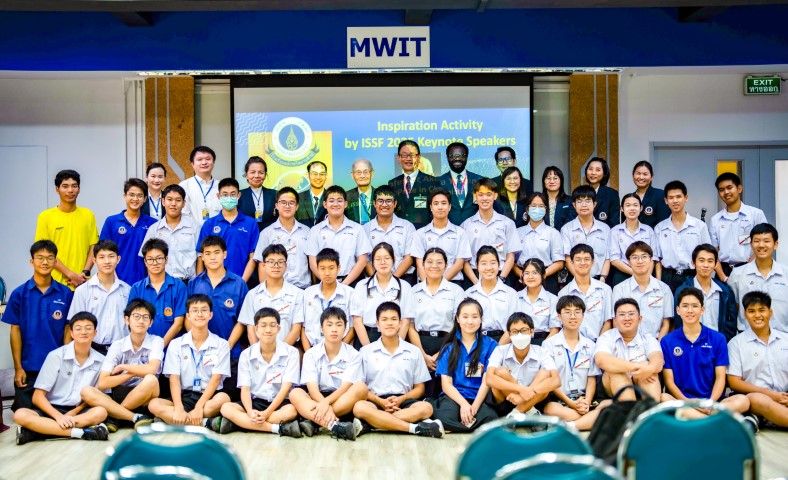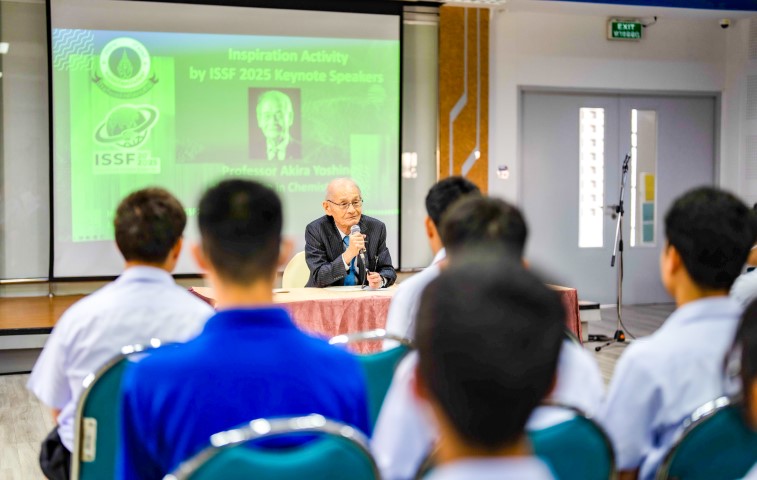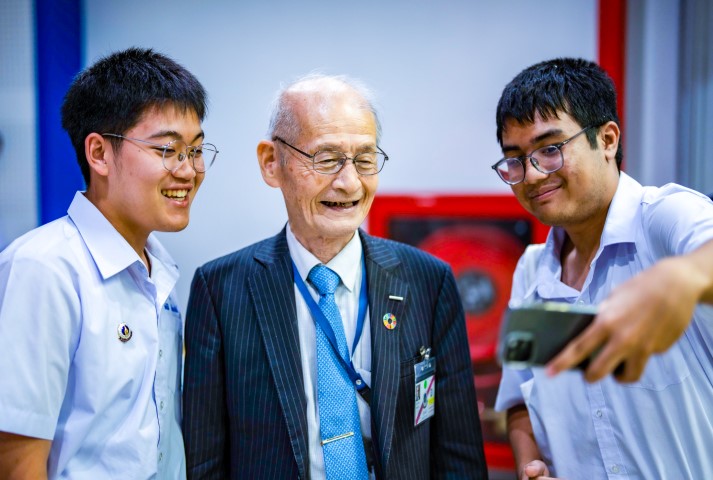Professor Akira Yoshino, Nuchutha Thamsumet, Nichakan Khuichad, and Matava Vichiensing
Mahidol Wittayanusorn School (MWIT) was deeply honored to welcome Professor Akira Yoshino as one of the keynote speakers at the opening ceremony of the 20th International Student Science Fair (ISSF). Professor Yoshino, recipient of the 2019 Nobel Prize in Chemistry for his groundbreaking innovation of lithium-ion batteries, inspired students with his insights and experiences. During his visit, MWIT students had the invaluable opportunity to participate in an Inspiration Activity, where they engaged directly with the Nobel laureate, asking questions ranging from his research to his life philosophies.
Early Inspirations and the Path to Science
Professor Yoshino opened the session by warmly greeting MWIT students and teachers and sharing the story of what first inspired him to pursue science and become a researcher.
“Good afternoon. My name is Akira Yoshino. When I was an elementary school student, my teacher, who specialized in chemistry, recommended several science books to me. One book I remember vividly is The Chemical History of a Candle by Michael Faraday. Reading this book sparked my interest in science, particularly chemistry. As I progressed through school, my passion for science grew stronger.
When I entered high school and later university, I had to choose a faculty. I decided to join the Faculty of Engineering, specializing in the Chemistry Division. After graduation, I faced two options: joining a company or pursuing academia at a state university. I chose the corporate path and joined Asahi Kasei Corporation, one of Japan’s most renowned chemical companies, as I was very interested in developing new materials and products. Early on, I also had to decide whether to become an engineer or a researcher, and I ultimately chose research.”
Professor Yoshino’s path to science was shaped by pivotal moments, beginning with the influence of his elementary school teacher when he was around ten years old. The recommended book fueled his curiosity about how chemical reactions explain natural phenomena, which led to a lasting passion for chemistry. Motivated by a desire to innovate and create new technologies, he pursued engineering and ultimately chose a career in research.
How Do Innovations Develop?
One of the most intriguing questions posed to Professor Yoshino was about the development of lithium-ion batteries. He explained that corporate research typically follows three main stages:
- Basic Research – This stage involves exploring new scientific concepts and ideas as the foundation for future technologies. Feasibility and potential applications are studied for about two years. If promising, the research continues for another two years; if not, the theme is changed.
- Development Stage – Once a concept is validated, researchers address technical challenges such as material stability, efficiency, and safety. This stage generally takes four to five years before a product is ready for commercialization.
- Market Creation Stage – After development, bringing a product to market requires scaling production, forming partnerships, and navigating regulatory and economic challenges. This stage typically takes another four to five years, making the full process from concept to market adoption around 15 years.
“There are two common approaches to selecting a research theme: 1) Starting from a material, technology, or personal experience, and 2) Predicting future market needs.
In my case, my initial research themes were unsuccessful. I began my research in 1981 with a new material, polyacetylene. At that time, my work was unrelated to batteries, but I gradually recognized its potential for battery applications. Anticipating major technological advancements over the next 10–15 years, I focused my research on the growing need for portable energy solutions, which eventually led to the concept of lithium-ion batteries.
My ultimate goal was to establish the fundamental principles that would make lithium-ion batteries viable. Using a metal oxide as the cathode and a carbon-based material as the anode was the foundation of the invention. From there, the technology was refined to ensure its practicality and safety before commercialization.”
Professor Yoshino also shared advice on choosing a career.
“You can take a similar strategic approach. If you aspire to be a diplomat, study English and history. If you excel at English, explore careers that require language proficiency. The same kind of strategic thinking applies to selecting research themes and career paths.”
Challenges and Collaboration in Research
Each research stage comes with its own challenges and levels of collaboration:
- Basic Research: Discovering new materials or reactions is highly difficult but allows for intellectual freedom. This stage often involves individual work with limited collaboration.
- Development Stage: Overcoming technical challenges to make research commercially viable requires years of effort and collaboration with other companies, universities, and researchers.
- Market Creation: Economic conditions, regulations, and competition heavily influence market success. Collaborations with key industry players, such as Toshiba in the case of lithium-ion batteries, are critical.
Although lithium-ion batteries were commercialized in 1991, they became widely recognized around 1995, driven by the information technology revolution and their use in devices such as mobile phones and laptops.
Professor Yoshino likened research to running a marathon: perseverance and belief in the goal are essential, even when faced with obstacles.
Receiving the Nobel Prize
Professor Yoshino shared his perspective on what it takes to receive a Nobel Prize:
“There are two primary types of Nobel Prizes:
- Discovering fundamental truths, like Professor Wang Yifang, who spoke at today’s opening ceremony about neutrinos.
- Creating technologies that change the world.
Lithium-ion batteries revolutionized mobile technology, making them a typical example of world-changing innovation. The core reason for receiving a Nobel Prize is contributing to humanity. If you’re aiming for a Nobel Prize, try pursuing either of these paths,” he said with a grin.
The Limits of Science
When asked, “Do you believe there are limits to what science can discover or explain?” Professor Yoshino answered thoughtfully:
“Science is not almighty. Everything has advantages and disadvantages. Science provides about 90% benefits and 10% drawbacks. Environmental problems, for example, have arisen from scientific and industrial development. However, science is also the tool we use to solve these problems.
Take the ozone layer issue. In the 1960s, holes in the ozone layer were discovered, growing larger each year. The identification of chlorofluorocarbons (CFCs) as the cause earned three scientists the Nobel Prize in 1995. Global collaboration led to the creation of new, safer compounds. By 2035, the ozone layer is expected to recover fully.
Science made our lives more convenient, but unexpected consequences followed. Still, science is what helps us address these challenges. That’s why science, though not perfect, remains essential.”



The Future of Battery Technology and Research
Professor Yoshino shared his thoughts on future innovations:
“Lithium-ion batteries will continue to improve, but there are also promising next-generation systems, like solid-state batteries, lithium-air batteries. However, commercialization will take time.
I believe future groundbreaking research will focus on solving environmental issues. Japan aims for a sustainable society by 2050, and innovations in biochemistry and artificial intelligence (AI) will be key. Technologies such as water electrolysis for hydrogen production and solar cells are crucial. Thailand, with its abundant sunlight, is particularly well-suited for solar energy development.”
Secrets to Productivity
As a final piece of advice, Professor Yoshino shared his personal productivity habit:
“Every Sunday afternoon, I dedicate time to plan my upcoming week. That’s when good ideas often come to me,” he said, smiling. “But remember to also enjoy life.”
An exclusive hour with Professor Yoshino passed very quickly, leaving a lasting impact on everyone who attended. We learned many things from his work, gaining valuable insights into the long and challenging journey behind world-changing innovations. His story is one of perseverance, intellectual curiosity, and the pursuit of practical applications that benefit society. As we look to the future, his words continue to inspire us to dream big, work hard, and use science to create a better world.


